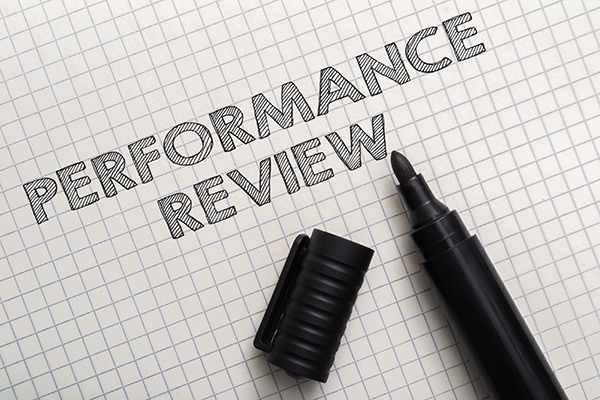Tips for Writing Performance Reviews

Schedule focused time for writing. There are a million things demanding your time and attention. Sometimes managers will try to fit writing reviews in between everything else already on their calendar. Instead, block off time to really focus. Shut off email and Teams. Go to a different location so people can't drop in and interrupt, if possible.
Review the entire year. It's human nature for the most recent events to stand out strongest in our minds, so be sure you are considering all of their work across the past year. One of the best ways to do this is to gather everything you need before you begin writing. Pull together all of your one-on-one notes, project notes, reports they've done, etc. It can also be helpful to do a quick review of their Outlook calendar for the past year to see the big things they were working on throughout the year.
Write your review before reading their self-evaluation. This prevents their self-evaluation from becoming the baseline that you build from. It can also highlight areas where there are gaps either in feedback or their perception of their work performance. After writing, you can then read their self-evaluation to see if there is anything you missed, hadn't considered, or need to address and edit your review accordingly.
Try not to do all the reviews at once. After a while, all the reviews can kind of blur together and it's easy to forget details or start comparing employees to each other instead of the requirements and expectations of their job. It can be helpful to schedule multiple sessions to write and either only work on one review at a time or use an iterative process where you write the reviews and then return to them a few days later with fresh eyes.
Get additional input. Sometimes it can be helpful to seek input from your manager. They might have additional perspective, offer support, or it might just be good to loop them in. Some examples of scenarios where you may want to seek additional input include: you are a new manager, the employee's self-evaluation is significantly different from your review, there is a history of difficult communication with the employee, or the employee is a high performer ready for increased responsibilities.
No surprises. The performance review discussion should be one of the most uneventful, anticlimactic conversations you have all year. After all, it's just a summary of the significant events and conversations you're already had throughout the year. A good manager is giving feedback in real time and not storing it up for the review so there really should be nothing new in the review.
Additional resources are available.
